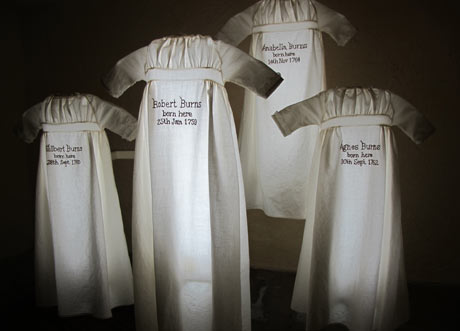
I once visited an old-fashioned little museum on the Isle of Wight devoted to Alfred Tennyson. The museum has changed now, and possibly I misremember the details, but my recollection is of seeing, in a glass case, Tennyson's spectacles, Tennyson's hat and Tennyson's pipe. Despite the charm of the arrangement, it also seemed to me to be deeply comedic that these bits of ephemera – so utterly irrelevant to his poetry – might become the objects of veneration.
Which is where the Robert Burns Birthplace Museum might seem to have a problem on its hands. What do you do with the enormous significance of Burns as a symbolic figure, which threatens to outweigh his heft as a poet? How do you connect visitors with the writing and bypass the myths (without killing the joy)? What about Burns's tricky, contested role as Scotland's national poet? (Edwin Muir once said that "for a Scotsman to see Burns simply as a poet is almost impossible"). These were some of the questions that ran through my head as, in my capacity as one of the judges for the Art Fund museums prize, I visited the newly reopened, enlarged and revamped Robert Burns Birthplace Museum in Alloway, Ayrshire.
In the gift shop, there are tartan boxes of Burns-branded shortbread and fluffy tim'rous beasties to buy and take home. But, for the large part, the museum (and its neighbouring sites, which include the Burns family cottage, the Burns Memorial, Alloway Auld Kirk and the Brig o' Doon) does a good job of distancing itself from the nonsense and presenting a picture of Burns that has a critical relationship with the bardolatry that ensued almost as soon as the poet died.
In the new museum's display, it shows objects such as Burns souvenir snowdomes, a little 19th-century box made from the wood of the bed in which he died, and translations of the poetry into languages from Faroese to Georgian; it also shows a quite remarkable painting of the Burns festival attended by 100,000 people in Alloway as early as 1844, and details of the trial of Alexander "Antique" Smith, convicted of forging Burns manuscripts. So, instead of ignoring (or indeed joyfully joining) the cult that grew up around Burns, the museum's display simply accepts it as a fact. Its implicit suggestion is that the Burns cult has had an inescapable impact on the way that Burns is read; like it or lump it, it is part of the history of Burns. And the uses and abuses of Burns are manifold – from the homage of Steinbeck's Of Mice and Men to a 1915 first world war recruitment poster, which quotes the lines:
"O! Why the deuce should I repline,
And be an ill foreboder?
I'm twenty-three, and five feet nine,
I'll go and be a sodger."
Crucially, too, the museum allows the poems to speak for themselves, with many points along the way where the visitor can pause to hear the poems being read or sung (I particularly liked the Burns "jukebox"). There's also a browsable electronic version of the Kilmarnock Edition, the first published collection of Burns's works, which gave me the insight that even that volume, from 1786, was published with a glossary so readers unfamiliar with Scots words such as dowie, spairge, wooer-bab, ramfeezl'd, breef and limmer* might receive enlightenment. In short, if it was good enough for the readers of 1786, there's no shame in turning to an edition with notes and a glossary in 2011 – and the best compliment I can give the Robert Burns Birthplace Museum is that it has drawn me back to the poetry.
*According to the glossary of the Kilmarnock Edition, dowie means "crazy and dull"; spairge "to spurt about like water or mire, to soil"; wooer-bab "the garter knotted below the knee with a couple of loops and ends"; ramfeezl'd "overspent"; breef "an invulnerable charm; limmer "a woman of easy virtue".

